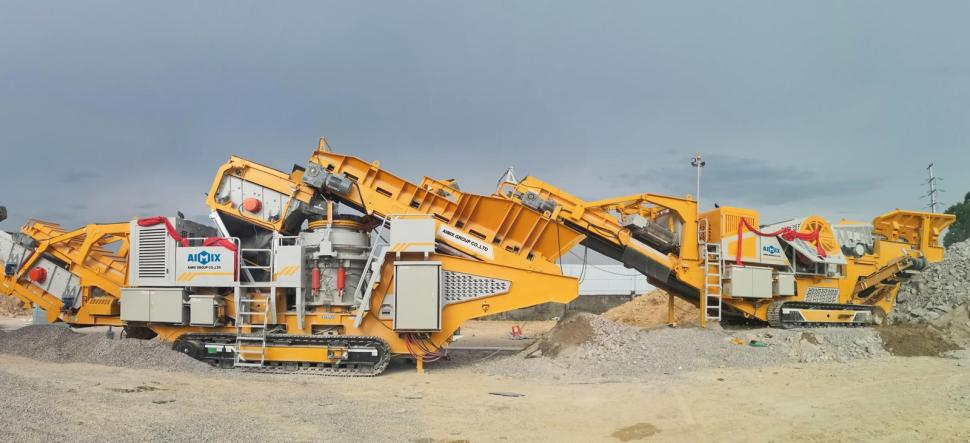How To Choose The Righet Concrete Crushing Machine For Sale?
- aimixglobal5
- Jul 25, 2024
- 3 min read
Choosing the right concrete crushing machine for sale is a pivotal decision that can significantly impact the efficiency and effectiveness of your construction or demolition project. With a wide array of options available, it is crucial to evaluate several key factors to ensure you select a concrete crushing machine for sale that meets your specific needs. This article provides a detailed guide to help you navigate the selection process, considering machine types, capacity requirements, and additional features.
Assessing Machine Types and Their Applications
Jaw Crushers
Jaw crushers are among the most commonly used machines for crushing concrete. Their design features two opposing jaws that crush material between them, making them highly effective for primary crushing applications. These machines are particularly well-suited for handling large volumes of hard, dense materials. They offer robust performance and reliability, but their efficiency can be limited by the size and hardness of the feed material. For projects involving large pieces of concrete or where initial material reduction is required, a jaw crusher may be the ideal choice.
Impact Crushers
Impact crushers, on the other hand, utilize high-speed impactors to break down concrete. They are particularly effective for secondary and tertiary crushing, where finer material output is desired. These machines excel in processing smaller, less dense materials and are known for their ability to produce a cubical product with minimal fines. Impact crushers are well-suited for applications requiring precise particle size control and high throughput. When selecting an impact crusher, consider the specific requirements of your project, including the desired output size and material characteristics.

Evaluating Capacity and Performance Metrics
Production Capacity
When choosing a concrete crushing machine, it is essential to evaluate its production capacity. This metric determines the volume of material the machine can process within a given time frame. Production capacity is influenced by factors such as the machine's power, feed size, and operational efficiency. Higher capacity machines are suitable for large-scale projects that require high throughput, while machines with lower capacity may be more appropriate for smaller or more specialized tasks. Assessing your project's scale and volume requirements will guide you in selecting a machine with the appropriate capacity. On this page, you can choose the suitable capacity of crushing plant: https://aimixgroup.com/stone-crusher-plants/mobile-type/.
Size and Type of Feed Material
The size and type of feed material play a critical role in determining the suitability of a concrete crushing machine. Larger, more robust machines may be necessary for handling oversized or particularly tough concrete pieces. Conversely, for more manageable sizes or softer materials, a machine with less crushing power may suffice. Understanding the material characteristics, including its hardness, abrasiveness, and maximum dimensions, will help you choose a machine that can efficiently handle your feed material and deliver the desired output.

Considering Additional Features and Costs
Ease of Maintenance
The ease of maintenance is a crucial consideration when selecting a concrete crushing machine. Machines that are easy to maintain and service can reduce downtime and operational costs. Look for features such as accessible components, user-friendly maintenance procedures, and comprehensive support services from the manufacturer. Regular maintenance is essential for ensuring long-term performance and reliability, so selecting a machine that facilitates straightforward upkeep will contribute to its overall efficiency and cost-effectiveness.
Total Cost of Ownership
The total cost of ownership extends beyond the initial purchase price of the machine and includes factors such as operating costs, maintenance expenses, and potential downtime. While it may be tempting to focus solely on the upfront cost, it is important to consider the long-term financial implications. Evaluating the machine's fuel efficiency, wear and tear, and warranty provisions can provide a clearer picture of its overall value. Investing in a machine with lower operational and maintenance costs can lead to significant savings and improved return on investment over time.
In conclusion, selecting the right concrete crushing machine involves careful consideration of machine types, capacity, performance metrics, and additional features. By evaluating these factors in the context of your specific project requirements, you can make an informed decision that enhances efficiency, reduces costs, and ensures optimal performance. Whether you need a robust jaw crusher for primary crushing or an efficient impact crusher for fine material processing, understanding these critical elements will guide you in choosing the most suitable equipment for your needs.




Comments